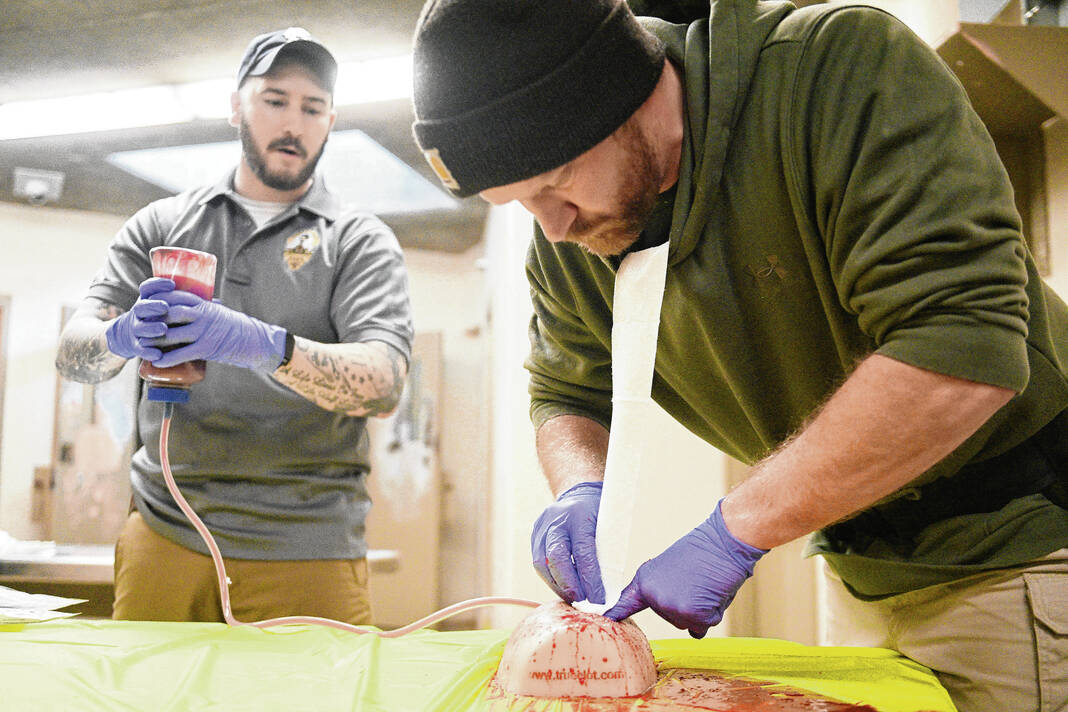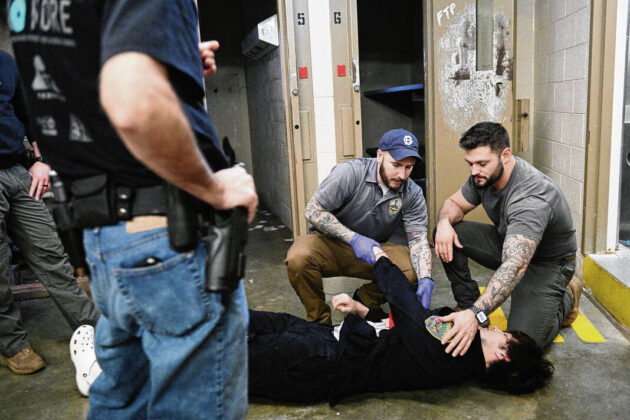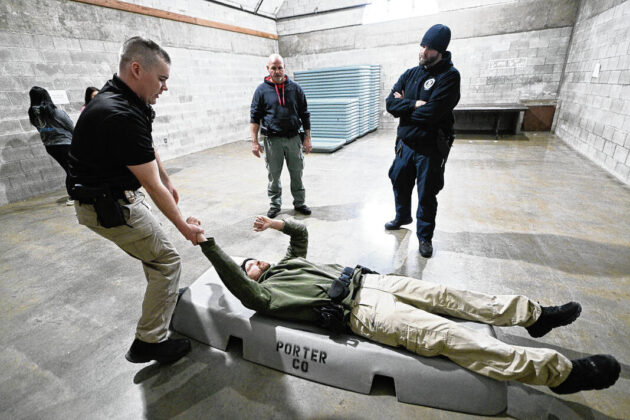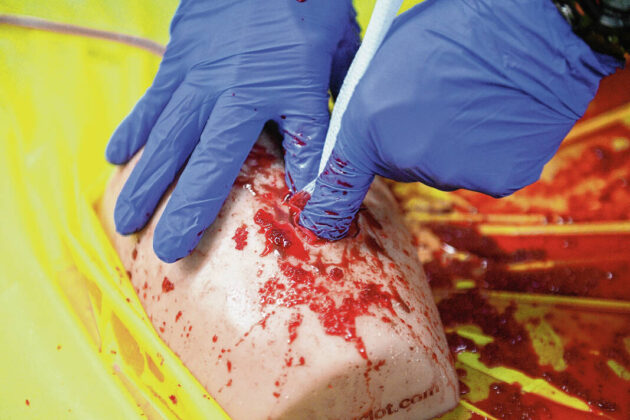GREENFIELD — During a recent police call, two officers from the Greenfield Police Department came across a man who was in dire need of medical aid. The officers offered as much help as they could to keep the man alive until medical personnel arrived and took over.
Those kind of life-saving skills are key for officers who are often first on the scene of an incident and GPD administrators know that. In order to make sure their officers are better prepared for dire medical situations, the department is holding a specialized Tactical Medicine (TACMED) class for their officers this week.
All officers, including GPD Chief Brian Hartman, are taking part, attending the instructional classes in the morning and then real-life, hands-on tactical combat medical training in the afternoon at the old county jail.
Sitting on a table inside the old jail with rubber gloves on his hands, Hartman had just finished going through one segment of the training where he had to apply several feet of gauze to stop an artery in a fake wound from bleeding.
“This is some of the best training we can have to protect ourselves as officers and the public all at the same time,” Hartman said. “It’s one thing to see what you’re supposed to do in situations like this, but it’s another thing to do it.”
From dealing with massive wounds to helping unclog airways, Hartman noted being able to care for the community is part of being a police officer.
“We need this type of training because we’re seeing more incidents, where it’s more prevalent,” Hartman said. “This type of training will come in handy should there be a mass-casualty situation or even in a single-car accident.”
The training went as far as to bring in role players, vocational students from Eastern Hancock and New Castle who are interested in being an EMT or police officer, to act as injured citizens. The training also included using prop simulators with fake blood to make the training as real as it gets.
“There are several reasons this type of training is important, but most of all, it goes into much greater depth than standard first aid,” Deputy Chief Charles McMichael said.
The training is designed to cover offering aid for situations such as severe injuries from gunshot wounds, stab wounds, amputations and other severe-blood-loss scenarios. It’s the kind of training to help officers be able to help keep people alive until an EMT can get there.
“We have had several of these instances in the past year that highlight the need,” McMichael said.
Greenfield Police Department patrolman Andrew Pfaff is the lead instructor for the classes, which run through Thursday. Pfaff said the medical skills required of officers nowadays is more of a necessity.
“We’re public servants and we’re trying to provide a better service to the community,” Pfaff said.
Patrol officers are always on the roads and are often the very first responders to all kinds of situations, including people in need of medical care. Therefore, many feel like they need better training in that department.
“A medical run can come across and we might just be a block over and closer than a fire truck or an ambulance, and we need to be able to render aid to someone who needs assistance and we could increase the chances of them surviving if we’re trained properly,” Pfaff said.
Pfaff noted, the training is something GPD officers can use outside of their work shifts since many GPD officers live in the county. They can jump in and help when and where help is needed, if trained properly.
“We live in a community where a lot of people including officers might be out on farms where all kinds of dangerous equipment is used, and you never know when you might need to help,” Pfaff said. “The idea is to give skills to officers they can use while on duty and off.”
The Federal Law Enforcement Academy has trained several officers like Pfaff in tactical combat medical training, and GPD officials felt it was good to offer that knowledge to all their officers.
“We’ve taken a lot of that material and put it into our own program,” said Pfaff, an eight-year law enforcement officer. “We have sort of a fancy movie make-up kit where we’re creating fake wounds on legs and arms to make this realistic.”
Officer Brandon Pope also has TACMED training and was one of the instructors working with a simulated wound trainer. He told the officers he could simulate a heartbeat, which pushed the fake blood out of the wound so they could get a real feel for what type of aid would be needed to stop the bleeding from a serious injury.
“It could be a knife wound or a gunshot wound — any type of wound you cannot seal with a tourniquet,” Pope said.
He then showed the officers how to stuff multiple feet of gaze into the wound to save the victim.
“Keep pushing it in there,” Pope said to the officer who had already stuffed a large amount of gaze in the wound.
Pfaff summed the training up by saying the better prepared officers are to serve a community, the better the community is going to be.
“We want to be the best community servants we can be, and sometimes that means helping in a medical situation,” Pfaff said.








